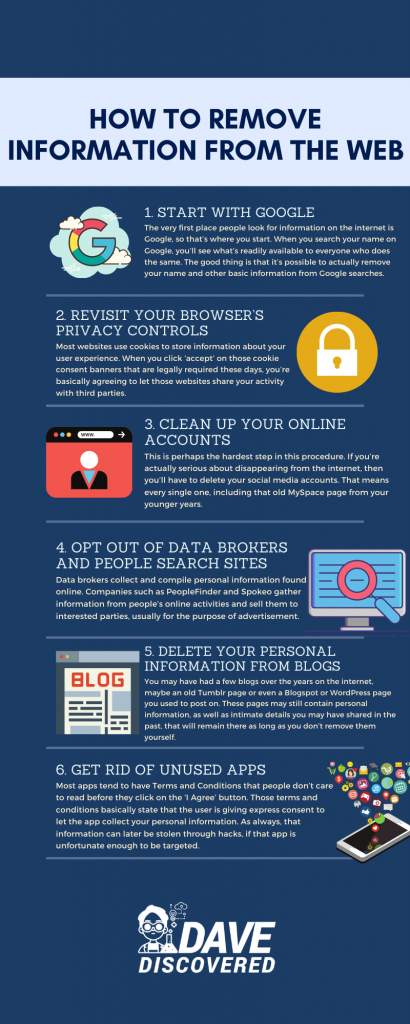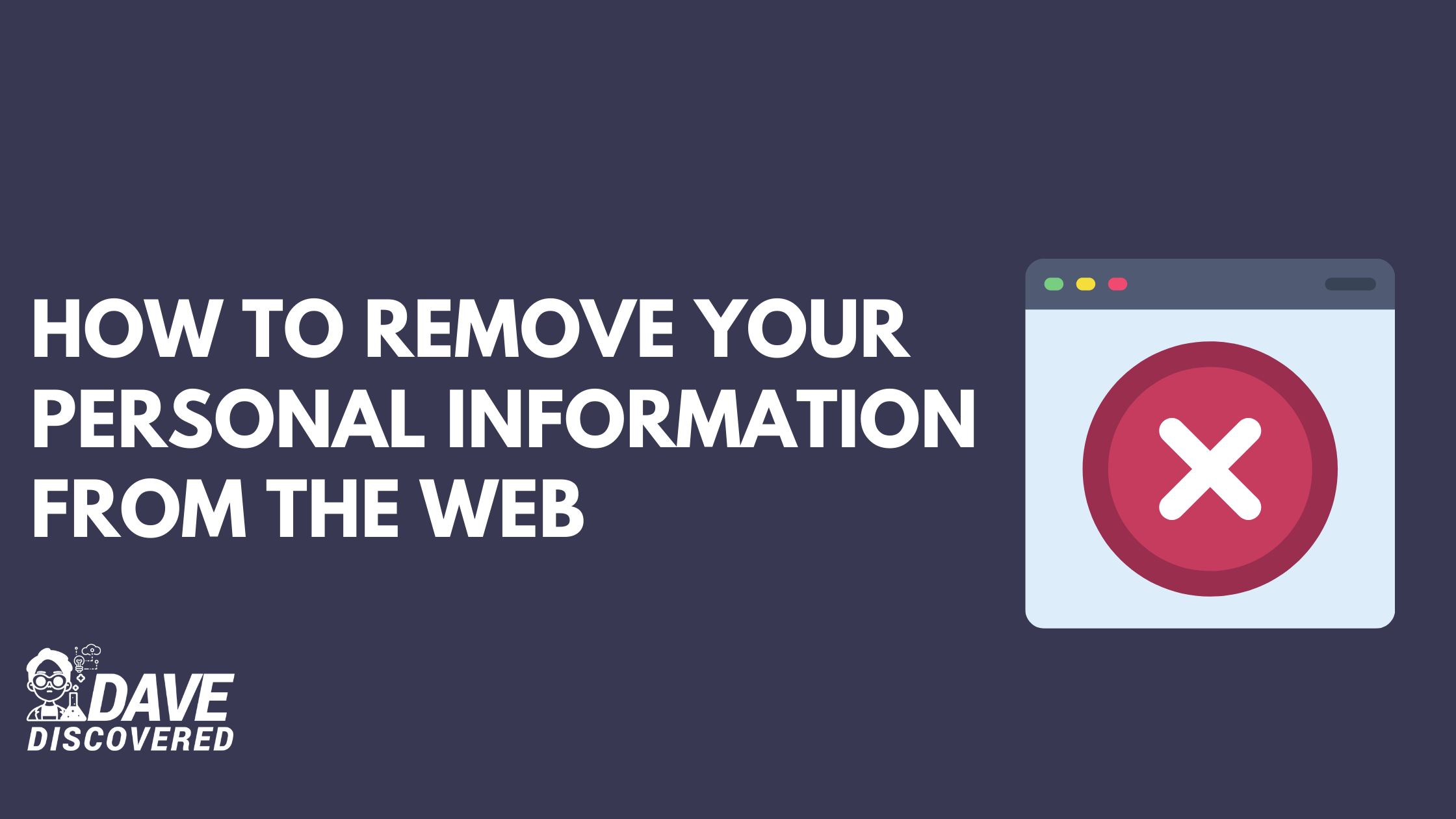Nowadays, with the internet and social media having become ubiquitous in our daily lives, much of our own personal information is made available online. Most of us don’t even think about it anymore, and that can be alarming as anyone can look up details about us at any time, especially from social media and other sources of open source information.
A lot of that information may not have been shared willingly. There may be a time when you’re no longer comfortable with that. You want to exercise your right to privacy, and that means no longer having your personal information easily available online. But removing what’s already there isn’t that easy since it’s the internet. As they say, what’s on the internet is there forever.
But it’s actually possible, believe it or not. Let’s take a look at what it takes to remove your name from Google for free, along with the rest of your personal information and keeping it that way.
Types of Sensitive Information
First off, let’s take a closer look at what constitutes sensitive personal information that you may want to be removed from the internet. Whether it’s to keep fraudsters and other malicious agents from accessing them or just not being comfortable with having them out in the open, you should prioritize the ones that are most sensitive.
Such information include the following:
Personal identification: Full name, parents’ name, mother’s maiden name, birthday
Personal history: Education, employment, other achievements
Contact information: Physical address, telephone number, email address
Financial information: Bank account number, credit card number, social security number, health insurance data, taxpayer identification number
Personal identification and history are the ones that tend to be most available as people tend to fill them up for their social media profiles. Contact information is less shared as some people are not comfortable with letting strangers online know where they live or let them be able to call or message them. That’s the type of stuff that stalkers and other malicious agents tend to look for.
Financial information is the stuff that fraudsters are most interested in, and you definitely don’t want them to be available at all. If anyone with bad intentions gets a hold of that information, they can wreak havoc on your life.
They don’t even have to hack you directly to get all that information on you. Web services get hacked all the time, and those data breaches provide them a rich bank of information they can use to steal from those users. Also, there are data brokers who sell user information gathered from everywhere on the internet.
Also, many people who are wary about their personal information being tracked are just creeped out by all the online ads that seem to know a little too much about their buying history and spending habits. They don’t like being told what they may spend their money on next as it can feel intrusive and uncalled for.
That’s why learning how to remove your personal information from the internet is important. Knowing how lets you take better control of your life in this internet age.

How to Remove Information from the Internet
1. Start with Google
The very first place people look for information on the internet is Google, so that’s where you start. When you search your name on Google, you’ll see what’s readily available to everyone who does the same. The good thing is that it’s possible to actually remove your name and other basic information from Google searches.
Visit Google’s activity controls and manage ad personalization, YouTube history, and app and web activity. Google tends to collect data continuously, so it’s recommended that you “Auto Delete” your data on a regular interval. This is to keep Google from keeping your data and maintaining a track on your activities.
You can also stop using Google as your main search engine and use a privacy-conscious alternative like DuckDuckGo. The less your online activities are actively tracked, the less of a trace you’ll leave behind and the more you’ll stay invisible.
2. Revisit your browser’s privacy controls
Most websites use cookies to store information about your user experience. When you click ‘accept’ on those cookie consent banners that are legally required these days, you’re basically agreeing to let those websites share your activity with third parties. This is how your activity is tracked from website to website.
Black hat hackers can put themselves in between a website and your computer by inserting a malicious cookie that can extract your personal information. The Brave and DuckDuckGo browsers were designed with privacy as a priority, so you may want to use those to block third-party cookies that can track your internet activity.
If you use some other browser, you may want to go into the settings and turn off cookies, then clear the cache of cookies. Other than that, you might as well switch to a browser like Brave or DuckDuckGo to prevent spreading fingerprints.
3. Clean up your online accounts
This is perhaps the hardest step in this procedure. If you’re actually serious about disappearing from the internet, then you’ll have to delete your social media accounts. That means every single one, including that old MySpace page from your younger years.
You can also set them to private in order to restrict public access, as well as deleting old posts that no longer speak for your current self. This is not as good, but it may be the best you can do if you still desire to be on social media.
For instance, there are online tools that let you delete your past tweets on Twitter. This is great if you’re looking to not get nailed to the wall for whatever you tweeted in the past that may not accurately represent your current views.
You’ll also want to delete whatever online accounts you’re no longer using, like those in online stores that may still contain your personal data, even if you only bought something there once.
4. Opt out of data brokers and people search sites
Data brokers collect and compile personal information found online. Companies such as PeopleFinder and Spokeo gather information from people’s online activities and sell them to interested parties, usually for the purpose of advertisement.
These data brokers are iffy since bad ones can both acquire information and use it with malicious intent. They may acquire your information without knowing about it, which is why it’s important to know how to opt out of them and not let them get a hold of your information.
Most of these data broker sites have an “opt out” option that you can use to remove yourself from their services. However, looking for these sites and opting out of them one by one is a daunting task, which is why you should look into tools for removing personal information online.
JoinDeleteMe.com
The best tool to remove information from web is DeleteMe. Go to JoinDeleteMe.com, register an account, pick a subscription plan, and have them take care of it for you. DeleteMe is composed of experts whose job it is to delete personal information from online data brokers, which will significantly reduce your data footprint online.
Such a service does most of the legwork for you, so you won’t have to worry about the tedium. You won’t have to comb through privacy policies of every site you wish to scrub clean of your information as they’ll do it for you. It’s an invaluable service that upholds your right for privacy.
5. Delete your personal information from blogs
You may have had a few blogs over the years on the internet, maybe an old Tumblr page or even a Blogspot or WordPress page you used to post on. These pages may still contain personal information, as well as intimate details you may have shared in the past, that will remain there as long as you don’t remove them yourself.
If you don’t care to keep those blogs up, then perhaps it may be best to remove them once and for all. We were all young once, and whatever you may have written on those blogs may not be representative of who you are now.
When you search your own name on Google and other search engines, you may find some ancient content you will want to delete. Removing them will go a long way to reduce your digital footprint.
6. Get rid of unused apps
Most apps tend to have Terms and Conditions that people don’t care to read before they click on the ‘I Agree’ button. Those terms and conditions basically state that the user is giving express consent to let the app collect your personal information. As always, that information can later be stolen through hacks, if that app is unfortunate enough to be targeted.
That’s even more so if you ever used one of those shady loan apps to borrow money in a pinch. Those are especially risky when it comes to giving up your personal information since they involve giving them your banking information.
If you no longer use those apps, you should delete them from your phone. Also, the next time you install new apps, you may want to double-check the Terms to see if your information will be collected and stored. You wouldn’t want them to track your activities.

